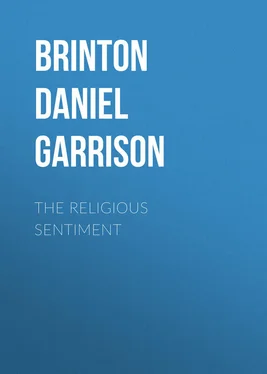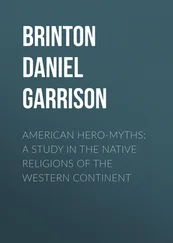Daniel Brinton - The Religious Sentiment
Здесь есть возможность читать онлайн «Daniel Brinton - The Religious Sentiment» — ознакомительный отрывок электронной книги совершенно бесплатно, а после прочтения отрывка купить полную версию. В некоторых случаях можно слушать аудио, скачать через торрент в формате fb2 и присутствует краткое содержание. ISBN: , Жанр: foreign_antique, foreign_prose, на английском языке. Описание произведения, (предисловие) а так же отзывы посетителей доступны на портале библиотеки ЛибКат.
- Название:The Religious Sentiment
- Автор:
- Жанр:
- Год:неизвестен
- ISBN:http://www.gutenberg.org/ebooks/30061
- Рейтинг книги:3 / 5. Голосов: 1
-
Избранное:Добавить в избранное
- Отзывы:
-
Ваша оценка:
- 60
- 1
- 2
- 3
- 4
- 5
The Religious Sentiment: краткое содержание, описание и аннотация
Предлагаем к чтению аннотацию, описание, краткое содержание или предисловие (зависит от того, что написал сам автор книги «The Religious Sentiment»). Если вы не нашли необходимую информацию о книге — напишите в комментариях, мы постараемся отыскать её.
The Religious Sentiment — читать онлайн ознакомительный отрывок
Ниже представлен текст книги, разбитый по страницам. Система сохранения места последней прочитанной страницы, позволяет с удобством читать онлайн бесплатно книгу «The Religious Sentiment», без необходимости каждый раз заново искать на чём Вы остановились. Поставьте закладку, и сможете в любой момент перейти на страницу, на которой закончили чтение.
Интервал:
Закладка:
In the concrete, matter shows the law in its efforts toward form, mind in its struggle for the true. The former is guided by physical force, and the extinction of the aberrant. The latter, in its highest exhibition in a conscious intelligence, can alone guide itself by the representation of law, by the sense of Duty. Such an intelligence has both the faculty to see and the power to choose and appropriate to its own behoof, and thus to build itself up out of those truths which are “from everlasting unto everlasting.”
A purely formal truth of this kind as something wholly apart from phenomena, not in any way connected with the knowledge derived through the senses, does not admit of doubt and can never be changed by future conquests of the reasoning powers. We may rest upon it as something more permanent than matter, greater than Nature.
Such was the vision that inspired the noble lines of Wordsworth: —
“What are things eternal? – Powers depart,
Possessions vanish, and opinions change,
And passions hold a fluctuating seat;
But, by the storms of circumstance unshaken,
And subject neither to eclipse nor wane,
Duty exists; immutably survive
For our support, the measures and the forms
Which an abstract intelligence supplies;
Whose kingdom is where time and space are not.”
There is no danger that we shall not know what is thus true when we see it. The sane reason cannot reject it. “The true,” says Novalis, “is that which we cannot help believing.” It is the perceptio per solam essentiam of Spinoza. It asks not faith nor yet testimony; it stands in need of neither.
Mathematical truth is of this nature. We cannot, if we try, believe that twice two is five. Hence the unceasing effort of all science is to give its results mathematical expression. Such truth so informs itself with will that once received, it is never thereafter alienated; obedience to it does not impair freedom. Necessity and servitude do not arise from correct reasoning, but through the limitation of fallacies. They have nothing to do with
“Those transcendent truths
Of the pure intellect, that stand as laws
Even to Thy Being’s infinite majesty.”
It is not derogatory, but on the contrary essential to the conception of the Supreme Reason, the Divine Logos, to contemplate its will as in accord and one with the forms of abstract truth. “The ‘will of God’” says Spinoza, “is the refuge of ignorance; the true Will is the spirit of right reasoning.”
This identification of the forms of thought with the Absolute is almost as old as philosophy itself. The objections to it have been that no independent existence attaches to these forms; that they prescribe the conditions of thought but are not thought itself, still less being; that they hold good to thought as known to man’s reason, but perchance not to thought in other intelligences; and, therefore, that even if through the dialectical development of thought a consistent idea of the universe were framed, that is, one wherein every fact was referred to its appropriate law, still would remain the inquiry, Is this the last and absolute truth?
The principal points in these objections are that abstract thought does not postulate being; and that possibly all intelligence is not one in kind. To the former objection the most satisfactory, reply has been offered by Professor J. F. Ferrier. He has shown that the conception of object, even ideal object, implies the conception of self in the subject; and upon this proposition which has been fully recognized even by those who differ from him widely, he grounds the existence of Supreme Thought as a logical unity. Those who would pursue this branch of the subject further, I would refer to his singularly able work. 19 19 The Institutes of Metaphysic , 2d Ed. See also Bain, The Emotions and the Will , the closing note.
The latter consideration will come up in a later chapter. If it be shown that all possible intelligence proceeds on the same laws as that of man, and that the essence of this is activity, permanence, or truth – synonymous terms – then the limitation of time ceases, and existence not in time but without regard to time, is a necessary consequence. Knowledge through intellection can alone reach a truth independent of time; that through sensation is always relative, true for the time only. The former cannot be expressed without the implication of the conceptions of the universal and the eternal as “dominant among the subjects of thought with which Logic is concerned;” 20 20 Boole, Laws of Thought , p. 401.
and hence the relation which the intellect bears to the absolute is a real and positive one.
The Religious Sentiment is made up of emotions and thoughts. The emotions are historically first and most prominent. Of all concerned, Fear is the most obvious. Hope is its correlate. Both suppose Experience, and a desire to repeat or avoid it. Hence a Wish is the source of both emotions, and the proximate element of religion. The significance of desire as the postulate of development. The influence of fear and hope. The conditions which encourage them.
The success of desire fails to gratify the religious sentiment. The alternative left is eternal repose, or else action, unending yet which aims at nothing beyond. The latter is reached through Love. The result of love is continuance . Illustrations of this. Sexual love and the venereal sense in religions. The hermaphrodite gods. The virgin mother. Mohammed was the first to proclaim a deity above sex. The conversion of sexual and religious emotion exemplified from insane delusions. The element of fascination. The love of God. Other emotional elements in religions.
The religious wish defined to be one whose fruition depends upon unknown power . To be religious, one must desire and be ignorant. The unknown power is of religious interest only in so far as it is believed to be in relation to men’s desires. In what sense ignorance is the mother of devotion.
CHAPTER II
THE EMOTIONAL ELEMENTS OF THE RELIGIOUS SENTIMENT
The discussion in the last chapter illustrated how closely pain and pleasure, truth and error, and thought and its laws have been related to the forms of religions, and their dogmatic expressions. The character of the relatively and absolutely true was touched upon, and the latter, it was indicated, if attainable at all by human intelligence, must be found in the formal laws of that intelligence, those which constitute its nature and essence, and in the conclusions which such a premise forces upon the reason. The necessity of this preliminary inquiry arose from the fact that every historical religion claims the monopoly of the absolutely true, and such claims can be tested only when we have decided as to whether there is such truth, and if there is, where it is to be sought. Moreover, as religions arise from some mental demand, the different manifestations of mind, – sensation, emotion and intellect – must be recognized and understood.
Passing now to a particular description of the Religious Sentiment, it may roughly be defined to be the feeling which prompts to thoughts or acts of worship. It is, as I have said, a complex product, made up of emotions and ideas, developing with the growth of mind, wide-reaching in its maturity, but meagre enough at the start. We need not expect to find in its simplest phases that insight and tender feeling which we attribute to the developed religious character. “The scent of the blossom is not in the bulb.” Its early and ruder forms, however, will best teach the mental elements which are at its root.
Читать дальшеИнтервал:
Закладка:
Похожие книги на «The Religious Sentiment»
Представляем Вашему вниманию похожие книги на «The Religious Sentiment» списком для выбора. Мы отобрали схожую по названию и смыслу литературу в надежде предоставить читателям больше вариантов отыскать новые, интересные, ещё непрочитанные произведения.
Обсуждение, отзывы о книге «The Religious Sentiment» и просто собственные мнения читателей. Оставьте ваши комментарии, напишите, что Вы думаете о произведении, его смысле или главных героях. Укажите что конкретно понравилось, а что нет, и почему Вы так считаете.












